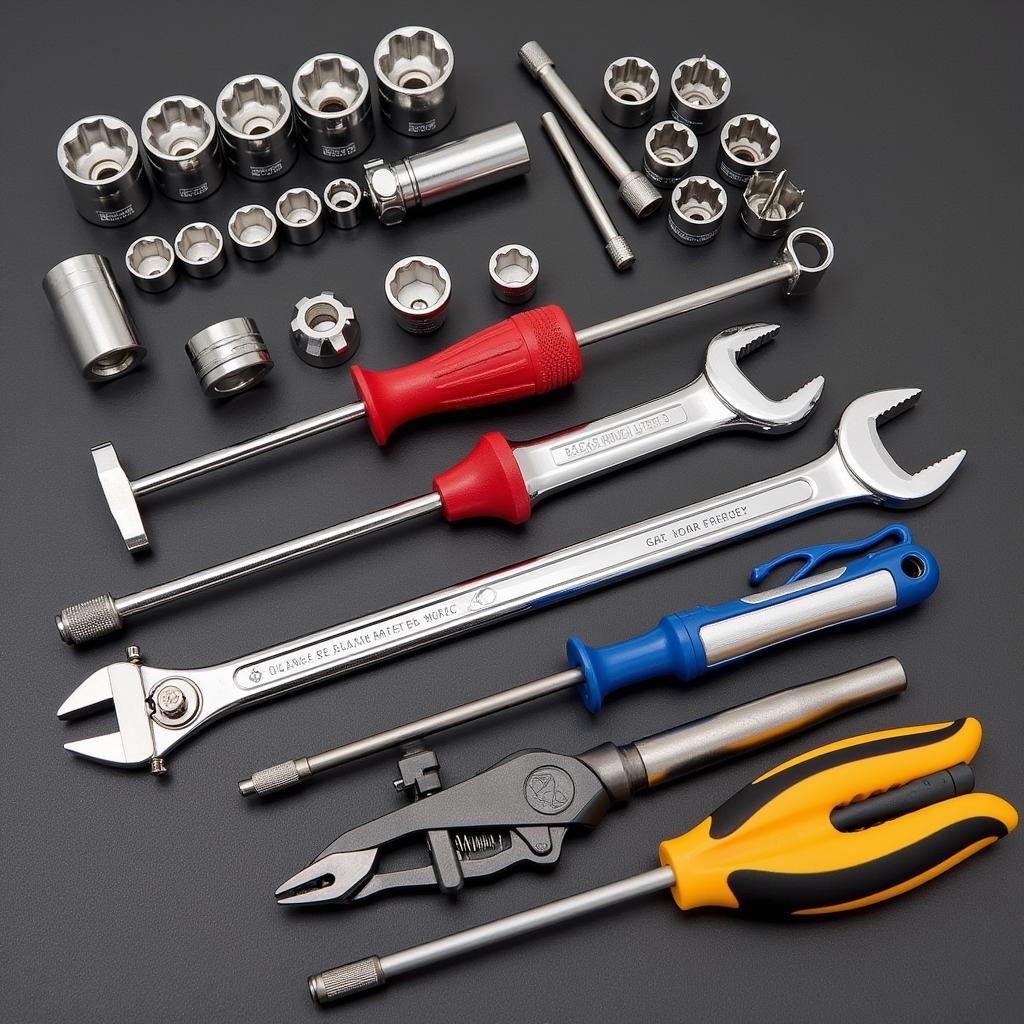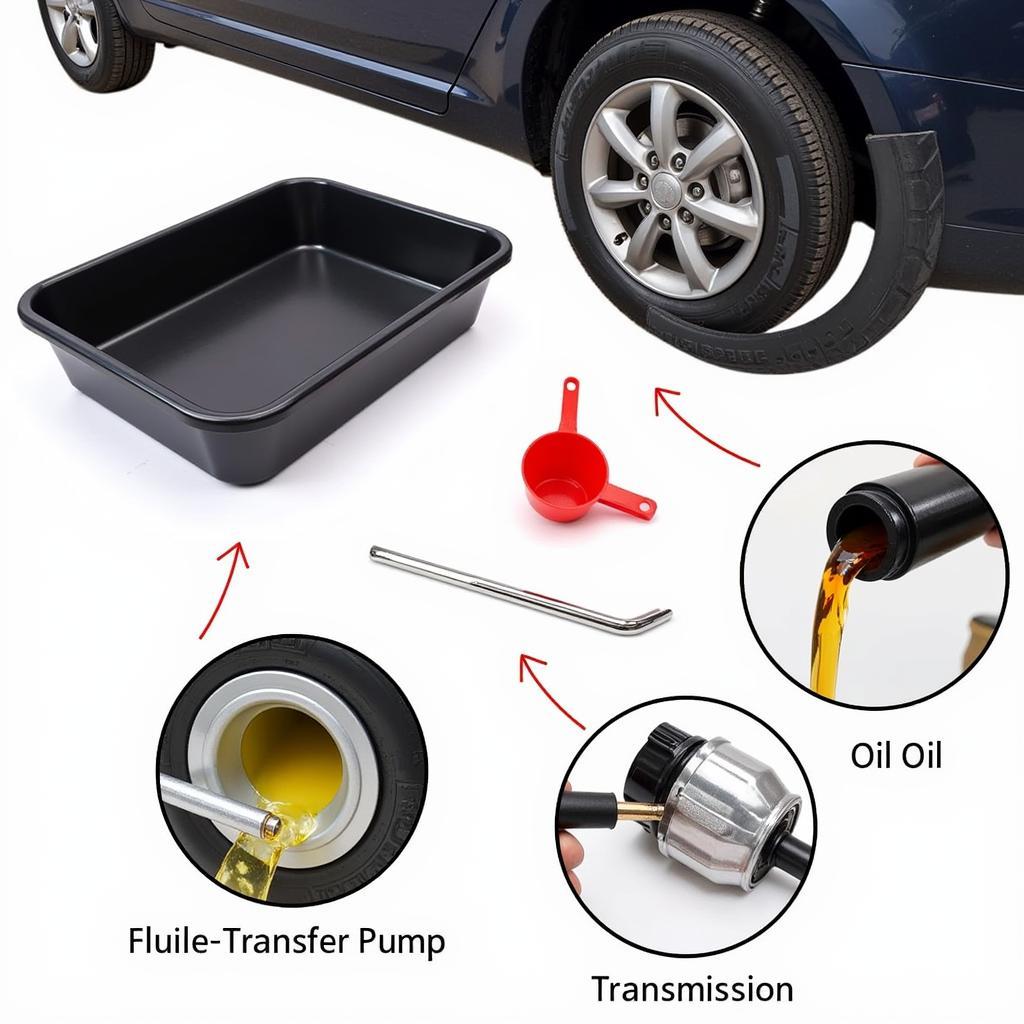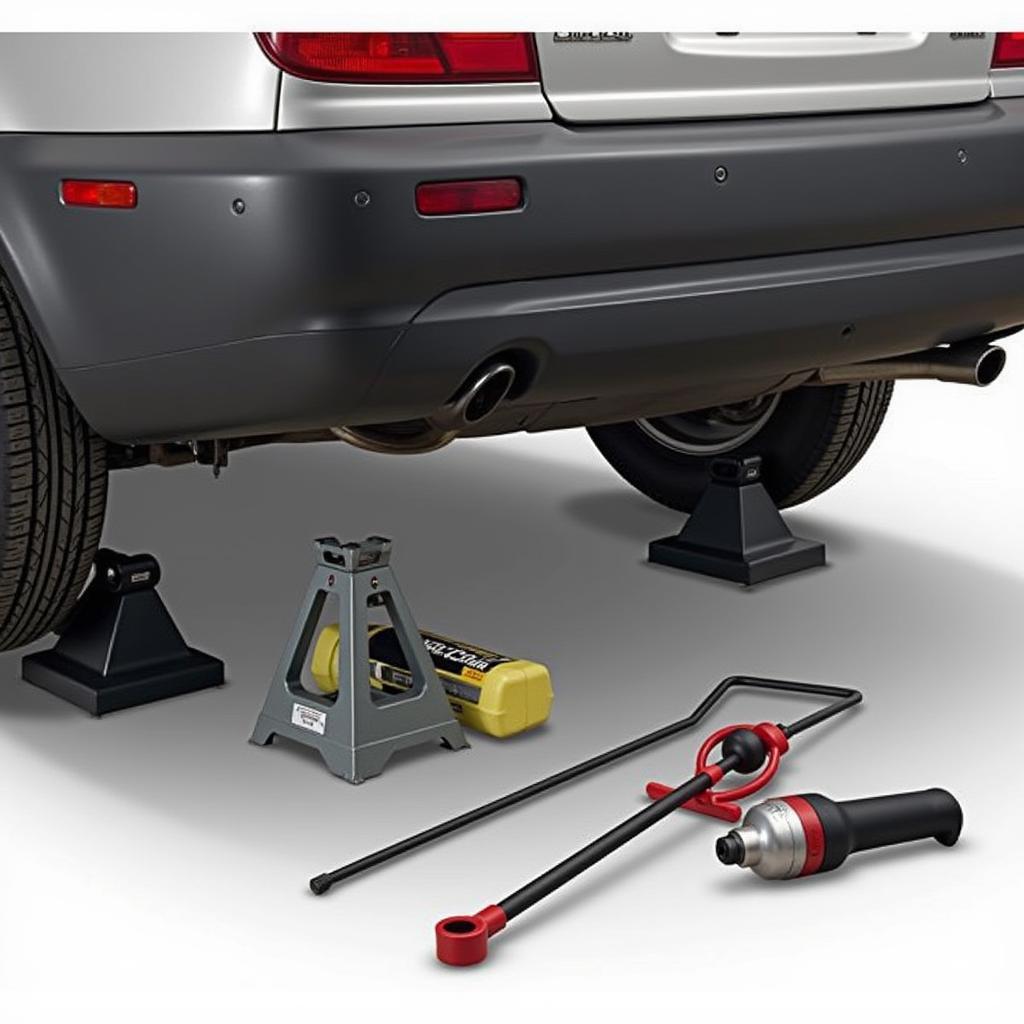Having the right Car Maintenance Equipment List is crucial for any car owner, mechanic, or technician. Whether you’re a DIY enthusiast tackling routine checks or a seasoned professional performing complex repairs, having the correct tools makes all the difference. This guide provides a comprehensive car maintenance equipment list for all skill levels, empowering you to keep your vehicle in top condition.
Essential Hand Tools for Your Car Maintenance Equipment List
Every car maintenance equipment list starts with a robust set of hand tools. These are the backbone of any repair, from simple oil changes to more intricate tasks. Think of them as your first line of defense against unexpected breakdowns.
- Wrenches: A variety of sizes, both metric and SAE (Standard American English), are essential for loosening and tightening nuts and bolts. Combination wrenches, which have both open-end and box-end designs, are particularly useful.
- Screwdrivers: Phillips and flathead screwdrivers in various sizes are necessary for removing screws. Invest in a set with magnetic tips to prevent dropped screws from disappearing into the engine bay.
- Pliers: Needle-nose pliers are great for reaching tight spaces and gripping small objects, while slip-joint pliers are ideal for gripping larger items and providing extra leverage.
- Socket Set: A comprehensive socket set with both metric and SAE sizes, along with extensions and a ratchet handle, is indispensable for working with nuts and bolts in confined areas.
- Torque Wrench: For tasks that require specific tightening torque, a torque wrench is crucial to avoid over-tightening or under-tightening, which can damage components.
 Essential Hand Tools for Car Maintenance Checklist
Essential Hand Tools for Car Maintenance Checklist
Diagnostic Tools: Taking the Guesswork Out of Car Repair
Modern cars are increasingly complex, requiring specialized diagnostic tools to pinpoint issues accurately. Including these in your car maintenance equipment list can save you significant time and money in the long run.
- OBD-II Scanner: This handy device plugs into your car’s diagnostic port and reads error codes, providing valuable insights into potential problems. Understanding these codes can guide your repairs and prevent unnecessary part replacements.
- Multimeter: A multimeter measures voltage, current, and resistance, allowing you to troubleshoot electrical problems and verify proper circuit operation.
- Test Light: A simple yet effective tool for checking for power and ground connections, a test light can help identify wiring issues quickly.
Car Maintenance Equipment List for Fluid Changes
Regular fluid changes are crucial for maintaining your car’s health. The following tools make these tasks smoother and more efficient.
- Oil Filter Wrench: This specialized wrench helps remove oil filters without damaging them.
- Funnel: A funnel prevents spills when adding fluids like oil, coolant, and brake fluid.
- Drain Pan: A sturdy drain pan collects old fluids for proper disposal.
- Fluid Transfer Pump: A fluid transfer pump makes it easy to remove fluids from tight spaces, like the differential or transmission.
 Essential Tools for Car Fluid Changes: Oil, Coolant, Brake Fluid
Essential Tools for Car Fluid Changes: Oil, Coolant, Brake Fluid
Specialized Tools for Your Advanced Car Maintenance Equipment List
For those who want to tackle more advanced repairs, these specialized tools are valuable additions to your car maintenance equipment list.
- Jack and Jack Stands: Safely lifting your car is crucial for tasks like brake repairs and tire rotations. Never work under a car supported only by a jack. Always use jack stands.
- Wheel Chocks: These wedges prevent your car from rolling when it’s lifted.
- Impact Wrench: An impact wrench quickly removes stubborn nuts and bolts, especially useful for wheel lug nuts.
- Breaker Bar: Provides extra leverage when loosening extremely tight fasteners.
 Advanced Car Repair Tools for DIY Mechanics: Jack, Jack Stands, Wheel Chocks
Advanced Car Repair Tools for DIY Mechanics: Jack, Jack Stands, Wheel Chocks
Keeping Your Car Maintenance Equipment Organized
A well-organized toolbox is a must for any car enthusiast or professional. Consider investing in a toolbox with drawers and compartments to keep your tools sorted and easily accessible.
“A well-organized toolbox saves you valuable time and frustration. It also protects your tools from damage and extends their lifespan,” says automotive expert, Michael Stevenson.
Conclusion
Building a comprehensive car maintenance equipment list is an investment in your vehicle’s longevity and your peace of mind. Whether you’re a weekend warrior or a seasoned mechanic, having the right tools empowers you to tackle repairs confidently. By following this guide, you’ll be well-equipped to handle routine maintenance and even more complex repairs, keeping your car running smoothly for years to come. Need more assistance with your car maintenance? Don’t hesitate to connect with us at AutoTipPro. Our team of experts is always ready to help. You can reach us at +1 (641) 206-8880 or visit our office at 500 N St Mary’s St, San Antonio, TX 78205, United States. We are always here to support you in all your automotive needs.
“Investing in quality car maintenance equipment is an investment in your vehicle’s future,” adds Sarah Johnson, a certified automotive technician. “It’s about being prepared and taking control of your car’s well-being.”
FAQs
-
What is the most important tool in a car maintenance equipment list? A good set of wrenches and screwdrivers is arguably the most fundamental part of any car repair kit.
-
Do I need an OBD-II scanner if my car is older? OBD-II scanners are generally compatible with cars manufactured after 1996. For older vehicles, you might need a different type of code reader.
-
How often should I change my car’s fluids? Refer to your owner’s manual for the recommended fluid change intervals for your specific make and model.
-
Is it worth investing in specialized car maintenance equipment? If you plan on doing more advanced repairs, specialized tools can save you money in the long run compared to taking your car to a mechanic.
-
Where can I learn more about car maintenance? There are numerous online resources, including YouTube channels and forums, that offer helpful tutorials and advice. You can also find valuable information in your car’s owner’s manual.
-
What are some basic safety tips for car maintenance? Always work in a well-ventilated area, wear safety glasses and gloves, and never work under a car supported only by a jack.
-
What should I do with used car fluids? Used car fluids, like oil and coolant, should be disposed of properly. Check with your local municipality for designated collection centers or recycling options.




Leave a Reply